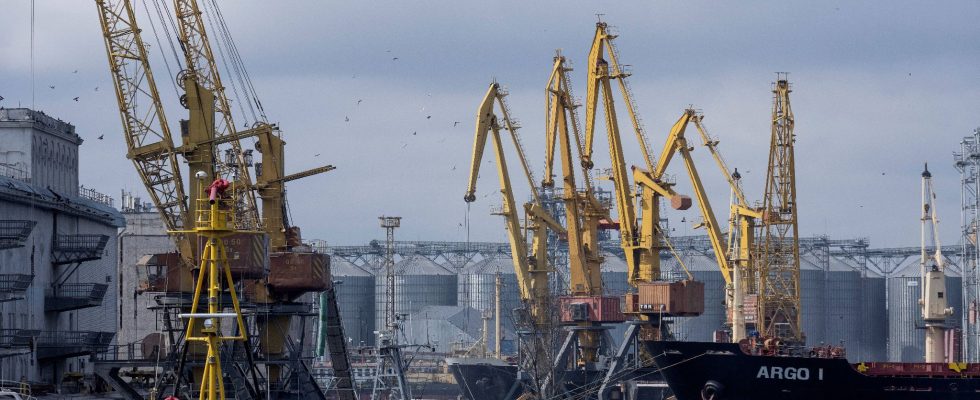Russian strikes continue in Ukraine. Ukrainian port infrastructure on the Danube, crucial for grain exports, was hit by Russian night strikes, the Prosecutor General of Ukraine said on Wednesday (August 2).
“The enemy attacked port facilities and industrial infrastructure on the Danube,” the prosecutor’s office said on Telegram, adding that “as a result of the strikes, an elevator, grain sheds, terminal tanks freight, warehouses and administrative premises have been damaged or destroyed”.
Russian attack on a port in the Odessa region
An attack by Russian explosive drones has damaged port infrastructure and caused fires in the Odessa region of southern Ukraine, regional governor Oleg Kiper announced on Wednesday. “Due to the attack, fires broke out at port facilities and industrial infrastructure in the region, and an elevator was damaged,” Oleg Kiper wrote on Telegram. No injuries were reported.
Ukraine says it shot down more than ten Russian drones launched against kyiv
kyiv was also targeted. More than ten Russian drones that targeted the Ukrainian capital were shot down overnight from Tuesday to Wednesday, causing falling debris that caused material damage but no casualties, authorities said. According to the Kyiv military administration, groups of Iranian-made “Shahed” explosive drones, coming from several directions, penetrated the skies of Kyiv simultaneously.
“All targets – more than ten drones – were detected and destroyed in time,” Serguii Popko, the head of the military administration, said on Telegram. Debris from downed drones, however, fell on the neighborhoods of Solomyansky, Golosiivsky and Svyatoshynsky. “There is damage to non-residential premises and road surfaces, without destruction or serious fires,” the military administration added on Telegram.
Poland summons Ukrainian ambassador, dispute over grain imports
Poland summoned the Ukrainian ambassador on Tuesday in reaction to a similar move by kyiv, caused by statements by a Polish official on Ukrainian grain imports.
In an interview on Monday with state television TVP, a Polish presidential adviser, Marcin Przydacz, said Warsaw was prioritizing “defending the interests of Polish farmers” by asking for restrictions on Ukrainian grain imports to be extended. “Ukraine has received a lot of support from Poland, it would be good if they started to be grateful for the role that Poland has played for Ukraine in the last months and years”, added Marcin Przydacz.
kyiv reacted by summoning the Polish ambassador to its foreign ministry on Tuesday. “Statements about the alleged ingratitude of Ukrainians for the aid received from the Republic of Poland do not reflect reality and are therefore unacceptable,” a Ukrainian statement read. Poland then responded by summoning Ukrainian Ambassador Vasyl Zvarych to the Foreign Ministry in Warsaw.
Iceland closes its embassy in Moscow
Iceland closed its embassy in Moscow on Tuesday, becoming the first European country to take such a step, while announcing a strengthening of its presence in Ukraine. This Nordic state, however, clarified that it was not a question of a break in diplomatic relations.
“As soon as conditions permit, Iceland will give priority to the resumption of the activities of the embassy in Moscow”, insisted in this regard in a press release the Icelandic Ministry of Foreign Affairs, which will now ensure in the capital Reykjavik the representation in Russia.
The ICC condemns a new arrest warrant in Russia against one of its judges
The International Criminal Court (ICC) on Tuesday condemned the addition to the wanted list in Russia of a judge who issued an arrest warrant for Vladimir Putin, calling it “another attempt to undermine the international mandate of the court “.
Russian news agency TASS reported last week that after ICC prosecutor Karim Khan and judge Rosario Salvatore Aitala, judge Tomoko Akane was in turn targeted by an arrest warrant in Russia.
The judge is described in the notice consulted by AFP as a woman born June 28, 1956 in Japan, wanted for violation of an article of the Russian Criminal Code, without specifying the nature of the offense. The Presidency of the Assembly of States Parties of the ICC said it was “deeply concerned” by this information.
Hammer and sickle removed from iconic giant kyiv statue
Down with the hammer and sickle: Workers removed Soviet symbols from a giant statue in Kiev on Tuesday, part of a campaign to eliminate symbols of the former USSR.
62 meters high and placed on a 40-meter high pedestal, the steel sculpture represents a woman brandishing a sword in one hand and a shield on the other with a sickle and a hammer, the Soviet emblem.
Known in Ukrainian as Batkivchtchyna Maty, literally “Mother of the Fatherland”, it was erected in 1981 in memory of the Soviet victory in World War II. The statue is to receive a new shield which this time will bear a trident, the emblem of Ukraine. It is part of the Museum of the History of Ukraine in World War II, whose director requested that the statue be renamed “Mother of Ukraine”.
